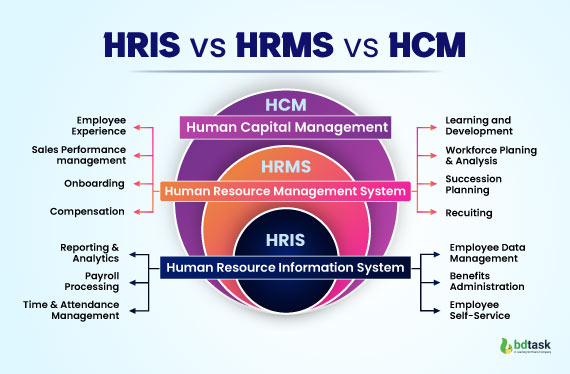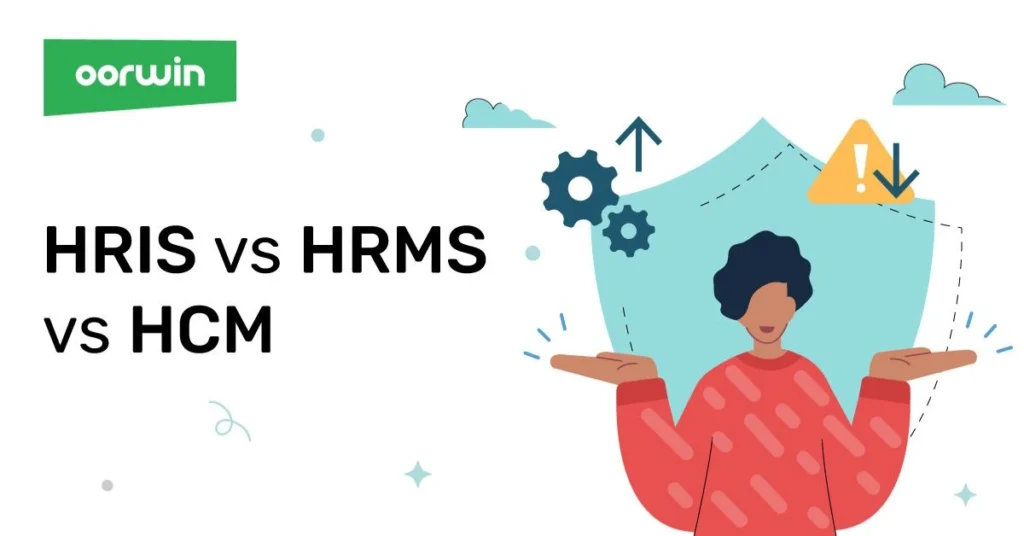Navigating the world of HR technology can feel overwhelming, especially when faced with a sea of acronyms like HRIS, HRMS, and HCM. You might wonder if these terms are just different names for the same thing or if they each serve a unique purpose.
Understanding the distinctions between these systems is crucial for making informed decisions that enhance your business’s efficiency and employee satisfaction. If you’ve ever been confused by these HR tech terms, you’re not alone. This guide will unravel the mystery and help you discover which system aligns best with your organization’s needs.
Keep reading to empower yourself with the knowledge to transform your HR strategy.
Hris Systems
In the world of human resources, technology plays a crucial role. An HRIS system, or Human Resource Information System, helps manage employee data efficiently. It serves as a digital solution for HR departments, streamlining many administrative tasks. But what exactly does an HRIS system do? Let’s dive into its core functions, benefits, and common challenges.
Core Functions
HRIS systems primarily store and manage employee information. They handle data like employee records, payroll, and attendance. These systems simplify the recruitment process by tracking candidates and their application status. Performance management becomes easier with built-in tracking tools. HRIS systems also assist in benefits administration, ensuring employees receive what they need.
Benefits For Organizations
Organizations benefit greatly from using HRIS systems. They reduce paperwork and save time for HR teams. These systems improve data accuracy by centralizing information. Decision-making becomes more informed with easy access to reports and analytics. HRIS systems enhance compliance by keeping up with labor laws and regulations. They also improve employee engagement through self-service portals.
Common Challenges
Implementing HRIS systems can present challenges. Integration with existing software may be difficult. Data migration requires careful planning to avoid errors. Training staff on the new system takes time and resources. Ensuring data security and privacy is a constant concern. Regular updates are necessary to keep the system running smoothly.

Credit: www.bdtask.com
Hrms Systems
Human Resource Management Systems (HRMS) are the backbone of modern HR operations. If you’ve ever wondered what makes HRMS systems so vital, you’re in for an informative journey. These systems transform traditional HR tasks into streamlined processes, offering a suite of tools to manage everything from payroll to performance evaluations. When you’re ready to upgrade your HR department’s efficiency, understanding HRMS is your first step.
Key Features
HRMS systems are packed with features that automate and optimize HR functions. Imagine a centralized database where you can store employee records, track attendance, and manage benefits all in one place. That’s the power of HRMS. It reduces paperwork and minimizes human error, allowing you to focus on strategic initiatives. Have you ever wasted hours sorting through files for a simple employee detail? With HRMS, that hassle is a thing of the past.
Integration Capabilities
Seamless integration is a hallmark of effective HRMS systems. They connect effortlessly with other business software like accounting and CRM platforms. This ensures that data flows smoothly across departments, enhancing collaboration and decision-making. Picture this: your HR data aligning perfectly with financial reports. It gives you a comprehensive view of your organization, making strategic planning more insightful. Are your current systems talking to each other? If not, HRMS might be the missing link.
Scalability Factors
As your company grows, your HR needs evolve. HRMS systems are designed to scale with you, accommodating an increasing number of employees and expanding functionalities. Whether you’re a startup or a large enterprise, HRMS adapts to your changing requirements. Consider your future growth: can your current HR system handle it? With HRMS, you ensure that your HR operations remain efficient and effective, no matter how big you get.
HRMS systems are more than just a technological upgrade; they’re a strategic asset. By leveraging key features, integration capabilities, and scalability factors, you can transform your HR department into a powerhouse of efficiency. Are you ready to make your HR operations more agile and responsive?
Hcm Systems
Human Capital Management (HCM) systems are powerful tools designed to manage and optimize your workforce. They go beyond traditional HR tasks, offering solutions that streamline processes, enhance productivity, and align HR strategies with business goals. By leveraging HCM systems, you’re not just managing employees—you’re cultivating a thriving company culture.
Comprehensive Solutions
HCM systems offer a wide range of functionalities. They integrate various HR processes, from recruitment to retirement. Imagine having payroll, performance management, and talent acquisition all in one place. This integration reduces paperwork and minimizes the risk of errors.
These systems provide real-time analytics, helping you make informed decisions. You can track employee engagement, monitor turnover rates, and assess training effectiveness. This data-driven approach empowers you to strategize effectively and stay ahead of the competition.
Strategic Benefits
HCM systems aren’t just about efficiency; they’re about strategy. They help you align HR goals with business objectives. When your HR operations are streamlined, you can focus on developing your workforce and driving growth.
Think about how strategic workforce planning can enhance your company’s productivity. By understanding skills gaps and future needs, you can proactively hire and train employees. This not only boosts performance but also improves employee satisfaction and retention.
Adoption Trends
The adoption of HCM systems is on the rise. Companies worldwide are recognizing their value. Have you noticed how many businesses are shifting towards cloud-based solutions? This trend reflects a growing demand for flexibility and scalability.
Modern HCM systems are designed with user experience in mind. They offer intuitive interfaces that make navigation easy for everyone. As more organizations embrace these systems, the focus is on creating a seamless experience for both HR professionals and employees.
Are you ready to leverage the benefits of HCM systems? Consider how these solutions can transform your HR operations and drive your business forward. With the right system in place, you can turn HR from a support function into a strategic partner.

Credit: ddi-dev.com
Comparing Hris, Hrms, And Hcm
Choosing the right HR software can be challenging for many businesses. HRIS, HRMS, and HCM are three popular systems. Each offers unique benefits for managing human resources. Understanding their differences can help make an informed decision.
Functional Differences
HRIS, HRMS, and HCM serve different purposes. HRIS focuses on data storage and management. It handles employee records, payroll, and compliance. HRMS builds on HRIS functions. It adds features like performance tracking and recruitment. HCM expands further. It includes talent management and strategic HR planning.
Cost Implications
Cost varies between these systems. HRIS is usually the most affordable. It offers essential features at a lower price. HRMS tends to cost more. It provides additional tools and functionalities. HCM systems are the most expensive. They offer comprehensive solutions for large organizations.
Best Fit For Business Needs
Every business has unique needs. Small companies might prefer HRIS for its simplicity. Medium-sized businesses benefit from HRMS with its extra features. Large corporations often choose HCM for its strategic capabilities. Selecting the right system depends on specific business goals.
Future Of Hr Technology
The future of HR technology is a thrilling landscape filled with possibilities that can redefine how you manage your workforce. As technology advances, systems like HRIS, HRMS, and HCM are evolving to meet the dynamic needs of modern businesses. Are you ready to explore how these changes might impact your organization?
Emerging Innovations
Imagine having a virtual assistant that can handle mundane HR tasks, freeing up your time for strategic planning. Emerging innovations in HR technology, like AI and machine learning, are making this a reality. These tools can automate repetitive processes, analyze employee data, and even predict future workforce trends. Have you considered how these innovations might streamline your HR operations?
Impact On Workforce Management
Efficient workforce management is crucial for productivity. HR technology is enhancing this by offering real-time insights into employee performance and engagement. Cloud-based systems allow you to manage your team from anywhere, anytime. This flexibility can lead to better communication and collaboration. Could adopting these technologies transform your workforce management strategy?
Predictions For Hr Evolution
What does the future hold for HR? Experts predict a shift towards personalized employee experiences. HR systems may soon offer tailored development plans and wellbeing programs. As these technologies become more intuitive, they could help you retain talent and boost morale. Are you prepared for the changes that could redefine your role in HR?

Credit: www.kayapush.com
Frequently Asked Questions
What Is The Difference Between Hris And Hrms And Hcm?
HRIS focuses on managing employee data and payroll. HRMS includes broader functions like recruitment and training. HCM covers strategic aspects like talent management and workforce planning. Each system serves different HR needs, enhancing efficiency and decision-making.
What Is The Difference Between Hrm And Hcm?
HRM focuses on traditional personnel management tasks, like recruitment and payroll. HCM includes HRM functions and adds strategic workforce planning, talent management, and employee engagement. HCM offers a broader approach by integrating technology to optimize workforce efficiency and drive business growth.
What Are The Three Types Of Hris?
The three types of HRIS are operational HRIS, tactical HRIS, and strategic HRIS. Operational HRIS focuses on managing employee data. Tactical HRIS aids in workforce planning and recruitment. Strategic HRIS supports long-term HR planning and policy-making.
Is Workday An Hris Or Hcm?
Workday is primarily an HCM (Human Capital Management) system. It offers comprehensive HRIS (Human Resource Information System) functionalities as part of its suite. This cloud-based solution integrates HR, payroll, talent management, and other essential business processes. Workday helps organizations manage their workforce efficiently.
Conclusion
Understanding HRIS, HRMS, and HCM is crucial for managing your workforce. These systems streamline HR tasks and improve efficiency. HRIS focuses on data management. HRMS offers more comprehensive features, including payroll. HCM covers all aspects of employee management, from hiring to retirement.
Each system has unique strengths. Choose the one that fits your business needs best. Evaluate your company’s size, goals, and budget. Making the right choice can enhance productivity. It can also support better decision-making. Invest in a system that aligns with your HR strategies.
Your team will thank you for it.

